Zuckerberg’s meeting with Trump preceded fact-checking policy shift, GOP senator reveals
- Meta CEO Mark Zuckerberg met with former President Donald Trump the day before announcing a major policy shift to end fact-checking on Meta’s platforms, raising questions about potential influence from Trump on the decision.
- The move to abandon fact-checking in favor of a “community notes” model is seen as an effort to address accusations of bias against conservative voices on Meta’s platforms.
- Zuckerberg has been strengthening ties with Republicans, including appointing GOP strategist Joel Kaplan as Head of Global Policy and hiring conservative consultant Brian Baker, signaling a shift in Meta’s political strategy.
- Meta faces an ongoing antitrust trial brought by the FTC, which alleges the company maintained a monopoly through its acquisitions of Instagram and WhatsApp. A federal judge ruled the case must go to trial.
- Beyond policy and politics, Zuckerberg has engaged in personal outreach, including inviting Senator Markwayne Mullin to spar, highlighting his efforts to build connections across the political spectrum.
Meta CEO Mark Zuckerberg met with former President Donald Trump just one day before announcing a major policy shift that would end fact-checking protocols on his social media platforms, according to a Republican senator. The revelation comes as Meta faces mounting scrutiny over its business practices and political maneuvering, including an ongoing antitrust lawsuit brought by the Federal Trade Commission (FTC).
Senator Markwayne Mullin (R-OK), speaking during an interview with Benny Johnson, disclosed that Zuckerberg had met with Trump on multiple occasions, including the day before the tech executive announced the pivot to a “community notes” model of content moderation.
“Mark met with President Trump the day before he announced that they were going to change the way that they do censorship, essentially,” Mullin said. “The big announcement that he made the other day, President Trump, and spoke about that, and Mark had been down to see the president several times already.”
The timing of the meeting has raised questions about whether Zuckerberg’s decision to abandon fact-checking was influenced by his discussions with Trump. The move has been widely interpreted as an effort to appease conservative critics who have long accused Meta’s platforms of bias against right-leaning voices.
Zuckerberg’s political pivot and GOP ties
Zuckerberg’s outreach to Trump appears to be part of a broader strategy to improve relations with Republican lawmakers and conservative figures. The National Pulse recently reported that Zuckerberg has elevated Joel Kaplan, a Bush-era Republican strategist, to the role of Meta’s Head of Global Policy. Kaplan replaces Sir Nick Clegg, the liberal former Deputy Prime Minister of the United Kingdom, signaling a shift in the company’s political alignment.
Kaplan’s appointment follows the hiring of establishment GOP consultant Brian Baker late last year, who was brought on to help Zuckerberg navigate the increasingly contentious political landscape. These moves suggest that Meta is actively working to shore up support among conservative leaders as it faces regulatory challenges and public criticism.
Mullin, a former mixed martial arts fighter, also revealed a more personal side to Zuckerberg’s outreach efforts. The senator said Zuckerberg had texted him multiple times, inviting him to spar.
“Mark has actually reached out to me, texted me a couple times,” Mullin said. “The guy’s gotten into jujitsu rehab. He wants me to come down there and roll with him. He wants to try and actually get in the cage and fight. He said, ‘I’d love for you to come down and spar if we can.’ I think that’d be great to go down there and do that.”
While the invitation to spar may seem unrelated to Meta’s political strategy, it underscores Zuckerberg’s efforts to build personal connections with influential figures across the political spectrum.
Meta faces antitrust trial amid policy shifts
Zuckerberg’s policy changes and political maneuvering come as Meta prepares to face trial in an antitrust lawsuit brought by the FTC. A federal judge ruled that the case, which alleges Meta illegally maintained a monopoly through its acquisitions of Instagram and WhatsApp, must proceed to trial.
U.S. District Judge James Boasberg denied Meta’s request to dismiss the case, though he did dismiss one portion of the lawsuit. In a 92-page opinion, Boasberg wrote, “In the end, while the parties’ legal jousting is both impressive and comprehensive, it leaves no clear victor. This case must go to trial. Under the forgiving summary-judgment standard, the FTC has put forward evidence sufficient for a reasonable factfinder to rule in its favor.”
The FTC initially sued Meta in 2020, accusing the company of stifling competition by acquiring Instagram in 2012 and WhatsApp in 2014. The case has been mired in pre-trial proceedings for years, with the FTC filing an amended complaint after an earlier dismissal in 2021.
Meta has denied the allegations, arguing that its acquisitions have benefited competition and consumers. “We are confident that the evidence at trial will show that the acquisitions of Instagram and WhatsApp have been good for competition and consumers,” a Meta spokesperson said in a statement.
As Zuckerberg navigates these legal and political challenges, his recent actions suggest a concerted effort to align Meta more closely with conservative interests. Whether these moves will help the company weather its antitrust trial and repair its public image remains to be seen.
For now, Zuckerberg’s meeting with Trump and his pivot away from fact-checking have added a new layer of intrigue to the ongoing debate over Big Tech’s role in shaping public discourse.
Sources include:
TheNationalPulse.com
Mediate.com
TheHill.com
Read full article here


